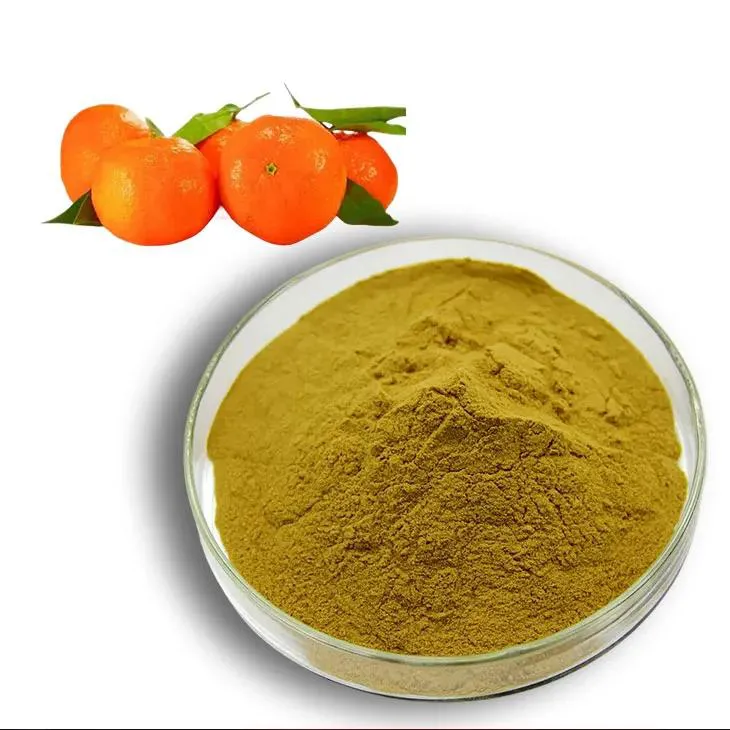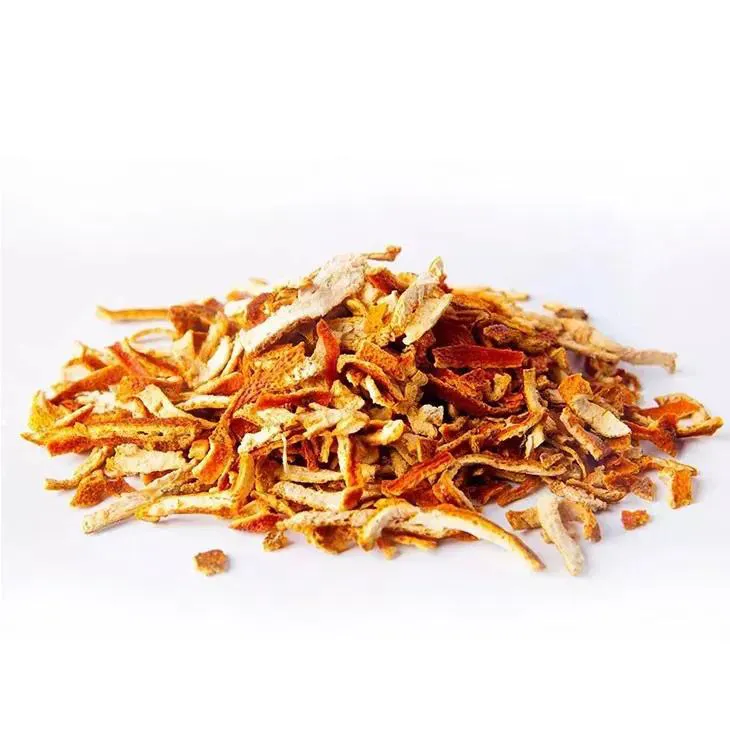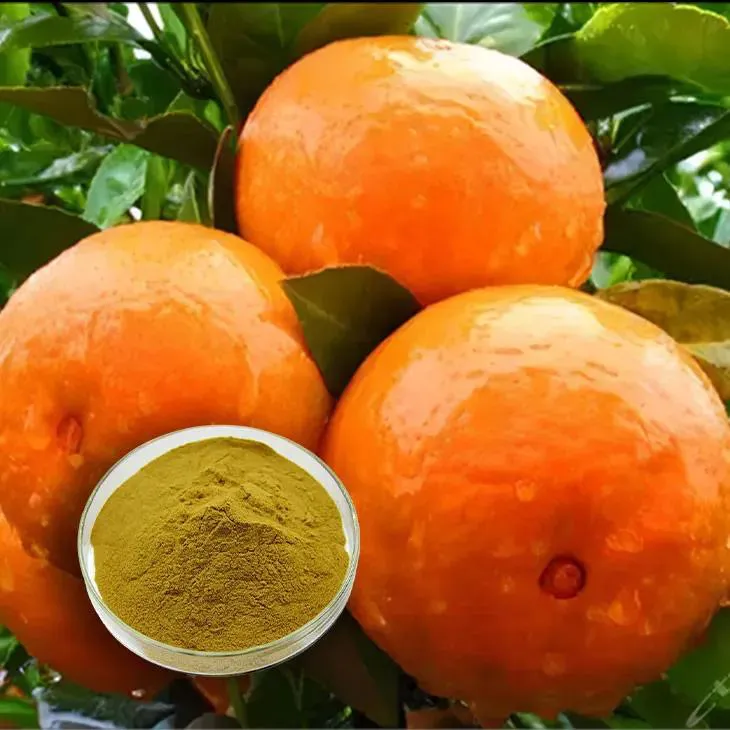- 0086-571-85302990
- sales@greenskybio.com
Which citrus bioflavonoids should you use?
2024-12-21

Introduction
Citrus bioflavonoids are a group of compounds that are found in citrus fruits such as oranges, lemons, and grapefruits. They offer a wide range of health benefits, from antioxidant properties to potential support for various bodily functions. However, with different types of citrus bioflavonoids available, it can be a challenge to determine which one is most suitable for an individual's needs. In this article, we will explore some of the common citrus bioflavonoids, including Hesperidin, Quercetin, and naringenin, and discuss the factors to consider when choosing which one to use.

Hesperidin
Hesperidin is a citrus bioflavonoid that has been the focus of much research due to its potential health benefits.
Benefits for Blood Vessel Health
One of the main areas where hesperidin shows promise is in promoting blood vessel health. It helps to strengthen the walls of blood vessels, which can in turn improve overall circulation. This is particularly important for those with conditions such as varicose veins. Varicose veins occur when the valves in the veins become weak and blood pools in the lower extremities. Hesperidin may help to support the integrity of the vein walls and improve the function of the valves, reducing the symptoms associated with varicose veins, such as swelling, pain, and fatigue in the legs.
Anti - Inflammatory Properties
Another significant aspect of hesperidin is its anti - inflammatory properties. Inflammation is a natural response of the body to injury or infection, but chronic inflammation can be linked to a variety of health problems, including heart disease, arthritis, and certain cancers. Hesperidin can help to modulate the body's inflammatory response, reducing the levels of inflammatory markers in the body. This can potentially contribute to a lower risk of developing chronic inflammatory conditions and may also help in managing the symptoms of existing inflammatory diseases.

Quercetin
Quercetin is a well - known citrus bioflavonoid with a diverse range of health - promoting properties.
Powerful Antioxidant
As a powerful antioxidant, quercetin plays a crucial role in combating oxidative stress. Oxidative stress occurs when there is an imbalance between the production of free radicals and the body's ability to neutralize them. Free radicals are highly reactive molecules that can damage cells, proteins, and DNA, leading to various health problems, including aging, cancer, and neurodegenerative diseases. Quercetin can scavenge free radicals, protecting cells from oxidative damage. It can also help to regenerate other antioxidants in the body, such as vitamin C and E, enhancing the overall antioxidant defense system.
Immune System Support
Quercetin also offers support to the immune system. It can enhance the function of immune cells, such as white blood cells, which are responsible for fighting off infections. By boosting the immune system, quercetin may help the body to better resist viruses, bacteria, and other pathogens. Additionally, it may have a role in modulating the immune response, preventing over - activation of the immune system, which can be harmful in some autoimmune diseases.
Anti - Allergic Properties
Another interesting aspect of quercetin is its potential anti - allergic properties. Allergies occur when the immune system overreacts to harmless substances, such as pollen or certain foods. Quercetin can inhibit the release of histamine from mast cells, which are involved in the allergic response. By reducing histamine release, it may help to alleviate allergy symptoms, such as sneezing, itching, and runny nose.

Naringenin
Naringenin is a citrus bioflavonoid that has shown potential in several areas related to health and metabolism.
Metabolism Regulation
One of the most promising aspects of naringenin is its role in metabolism regulation. It can influence various metabolic pathways in the body, potentially affecting how the body processes and stores energy. For example, naringenin may play a role in improving weight management. It can help to increase the body's energy expenditure, which means that the body burns more calories at rest. Additionally, it may also affect lipid metabolism, potentially leading to an improvement in the lipid profile. This could include reducing levels of LDL cholesterol (the "bad" cholesterol) and increasing levels of HDL cholesterol (the "good" cholesterol), which is beneficial for heart health.
Factors to Consider When Choosing a Citrus Bioflavonoid
When deciding which citrus bioflavonoid to use, several factors need to be taken into account:
Individual Health Goals
- If the goal is to improve blood vessel health or manage varicose veins, hesperidin may be a top choice.
- For those looking to boost their antioxidant defenses, support the immune system, or manage allergies, quercetin could be more suitable.
- Individuals interested in metabolism regulation, particularly for weight management or lipid profile improvement, might consider naringenin.
Existing Health Conditions
- People with a history of cardiovascular problems, such as high blood pressure or atherosclerosis, may benefit from hesperidin due to its effects on blood vessels.
- Those with a weakened immune system, for example, due to chronic illness or frequent infections, might find quercetin helpful in strengthening their immune response.
- Individuals with metabolic disorders, like diabetes or obesity, could potentially see benefits from naringenin's effects on metabolism.
Potential Drug Interactions
It is important to be aware of potential drug interactions when considering citrus bioflavonoid supplements. Some bioflavonoids may interact with medications, either enhancing or reducing their effectiveness. For example:
- Quercetin may interact with certain antibiotics, so it is crucial to consult a healthcare professional if taking antibiotics and considering quercetin supplementation.
- Hesperidin may affect blood - thinning medications, as it can have an impact on blood clotting. If on blood - thinning drugs, it is necessary to discuss with a doctor before starting hesperidin.
Conclusion
Citrus bioflavonoids such as hesperidin, quercetin, and naringenin offer a variety of health benefits. However, choosing the right one depends on individual health goals, existing health conditions, and potential drug interactions. It is always advisable to consult a healthcare professional before starting any new supplement. A healthcare provider can assess an individual's specific situation and provide personalized advice on whether a particular citrus bioflavonoid is appropriate and at what dosage. By taking these factors into consideration, individuals can make more informed decisions about incorporating citrus bioflavonoids into their health regimens.
FAQ:
What are the common citrus bioflavonoids?
The common citrus bioflavonoids include hesperidin, quercetin, and naringenin.
What is hesperidin good for?
Hesperidin is known for its potential in promoting blood vessel health and reducing inflammation. It can improve circulation and may be beneficial for those with varicose veins.
What are the benefits of quercetin?
Quercetin is a powerful antioxidant that can combat oxidative stress, support the immune system, and may have anti - allergic properties.
What can naringenin do?
Naringenin shows promise in metabolism regulation, potentially helping with weight management and lipid profile improvement.
What should be considered when choosing a citrus bioflavonoid?
When choosing a citrus bioflavonoid, factors such as individual health goals, existing health conditions, and potential drug interactions need to be considered. For example, if one has a history of cardiovascular problems, hesperidin might be a more suitable choice. However, it's always advisable to consult a healthcare professional before starting any new supplement.
Related literature
- The Role of Citrus Bioflavonoids in Health and Disease"
- "Citrus Bioflavonoids: A Comprehensive Review of Their Biological Activities"
- ▶ Hesperidin
- ▶ citrus bioflavonoids
- ▶ plant extract
- ▶ lycopene
- ▶ Diosmin
- ▶ Grape seed extract
- ▶ Sea buckthorn Juice Powder
- ▶ Beetroot powder
- ▶ Hops Extract
- ▶ Artichoke Extract
- ▶ Reishi mushroom extract
- ▶ Astaxanthin
- ▶ Green Tea Extract
- ▶ Curcumin Extract
- ▶ Horse Chestnut Extract
- ▶ Other Problems
- ▶ Boswellia Serrata Extract
- ▶ Resveratrol Extract
- ▶ Marigold Extract
- ▶ Grape Leaf Extract
- ▶ blog3
- ▶ blog4
- ▶ blog5
-
Pure 85% Tomentil Extract.
2024-12-21
-
Oyster Mushroom Extract Powder
2024-12-21
-
Astaxanthin
2024-12-21
-
Diosmin
2024-12-21
-
Horse Chestnut Extract
2024-12-21
-
Plantain extract
2024-12-21
-
Bilberry Extract
2024-12-21
-
Calendula Extract
2024-12-21
-
Jujube Extract
2024-12-21
-
Citrus bioflavonoids
2024-12-21
-
Chaste Berry Extract
2024-12-21




















